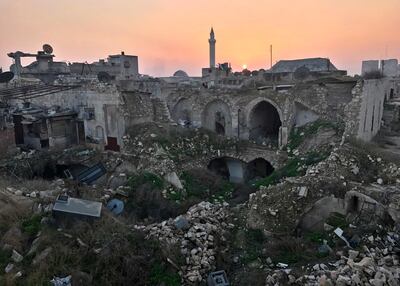Accepting President Bashar Al Assad as a legitimate partner in rebuilding Syria would be “harmful and self-defeating”, a new report argues today.
Published by Atlantic Council, the report rejects a top-down approach to reconstruction, saying this would “leave untouched the causes of Syria’s instability and would reward those who have helped destroy the country and displace its population”.
“The regime should be bypassed,” it states. “[Its] corruption and incompetence are established beyond debate.”
Instead, authors Faysal Itani, senior fellow at Atlantic Council, and independent international security analyst Tobias Schneider, argue that a ground-up international development strategy, led by the US and focused on empowering Syrian communities, is the best option for rebuilding the country after years of devastating civil war.
They also warn that Syria is not likely to see durable, nationwide peace “in the next few years”.
_______________
Read more:
The UN's 12-point Syrian charter is a glimmer of hope after regime snub
Syria peace talks will continue until December 15, UN envoy says
UN allowing Assad regime to lead Aleppo reconstruction
_______________
Absent a political settlement, rebuilding should focus on areas outside government control, the report says.
Immediate rebuilding efforts should focus mostly on northeast Syria (controlled by the Syrian Democratic Forces), southern Syria, and the Turkish-dominated ‘Euphrates Shield’ area in Aleppo province.
In order to rebuild in non-regime areas, robust de-escalation agreements are imperative. These should be enforced by the threat of force against the regime, in case of violations.
Drawing attention to the thousands of Syrians who have been displaced internally or made refugees during the conflict, the report urges any rebuilding strategy to place “high priority” on resettling those populations.
It also highlights the importance of enabling local communities to take ownership of the rebuilding efforts.
To achieve that goal, the report outlines ways in which local communities can be revitalised. These include: the provision of essential services such as healthcare, water, power and sanitation; rehabilitation and reconstruction of housing; access to education; access to short-term employment; and the restoration of freedom of movement and trade.

The main partners for reconstruction, the authors say, are local and provincial councils, nongovernmental organisations, and governments with influence over them.
The ideal outcome, it says, would be a “reconstruction plan that strengthens political legitimacy in Syria by upholding the security and dignity of the Syrian people”.
When planning the reconstruction of Syria, one should not assume a clean “post-war” scenario, the report warns.
“Western countries have set, as a condition for rebuilding, the need for a fair political settlement that is not on the horizon; and failure to plan for a more complex, less clear-cut scenario might be a missed opportunity,” it states.
Nor should the promise of rebuilding be used as a way of securing leverage over Assad.
“It is unlikely that the promise of stabilisation and reconstruction aid would give donors enough leverage over Assad to convince him to make a political deal with his opponents,” the report says. “Rebuilding should not, therefore, proceed on that assumption.”
Even so, the report argues that there is a “a compelling strategic rationale” for the international community to help in rebuilding Syria, given the potential long-term threats to the US and its allies caused by geopolitical instability, terrorism, and large-scale population displacement.
Finally, the report warns the international community against pursuing short-term opportunities to produce quick results.
While these may appear tempting, they could “reinforce Syria’s dysfunctional political economy, thereby laying the foundations for further exploitation of the population and conflict”.

